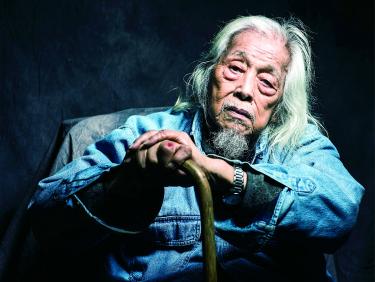Taiwanese yesterday offered messages of condolence after Taiwanese independence advocate Su Beng (史明) died late on Friday at the age of 100.
Doctors said he died from multiple organ failure.
Su Beng Education Foundation chairwoman Huang Min-hung (黃敏紅) thanked people who offered their condolences on Facebook.
“Su lived a long and fulfilling life, he does not owe Taiwan anything. Now it is up to Taiwan to determine its own path,” Huang told a news conference in Taipei.
Su’s last words were that “Taiwan must win, and to do so, [President] Tsai Ing-wen (蔡英文) must win a second term,” Huang said.
Su had no children or wealth, having dedicated his life and fortune to the independence movement, Huang said, adding that the foundation would find a suitable location for a memorial.
Many people left messages on Su’s Facebook page, thanking him for his efforts to promote democracy and independence.
Tsai late on Friday wrote on Facebook that she had just visited Su two days earlier, and that while his condition was critical, she had not expected him to pass away so soon.
They had Lunar New Year’s Eve dinner together every year, Tsai said, adding that she would leave a chair for him at next year’s dinner table to commemorate his life of dedication.
Premier Su Tseng-chang (蘇貞昌) yesterday said that Su Beng had dedicated his life to Taiwan, not only writing about its history, but also forgoing personal pleasures and dedicating his time to bringing about Taiwanese autonomy.
“We must cherish his memory and legacy, and guard it well, so that our progeny can be independent,” the premier said.
The Democratic Progressive Party tipped its hat to Su Beng for his efforts and said in a statement that it would continue efforts to reinforce the concept of Taiwanese sovereignty based on its Resolution on Taiwan’s Future.
Su Beng was born to a wealthy family in Taipei’s Shilin District (士林) on Nov. 9, 1918.
He left Taiwan to study at Waseda University in Japan, where he seemed to adopt Marxism. After graduating in 1942, he went to China, where he worked undercover as part of the Chinese Communist Party’s (CCP) anti-Japanese efforts.
He returned to Taiwan in 1949 because he was discontented with the CCP’s actions, and since then pushed for Taiwanese independence.
In 1952, he was a fugitive from the Chinese Nationalist Party (KMT) under Chiang Kai-shek (蔣介石) because of a plot to assassinate Chiang.
He stowed away on a boat to Japan, which gave him political asylum, and from 1952 to 1993 he operated a noodle shop in Tokyo, the proceeds of which he used to promote Taiwanese independence.
While there, he also began writing Taiwan’s 400-Year History (台灣人四百年史).
Named Shih Chao-hui (施朝暉) at birth, he changed his name to Su Beng — which means “historically clear” in Hoklo (commonly known as Taiwanese) — to underline the importance of having a clear understanding of history.
Su Beng returned to Taiwan in 1993 after martial law ended and his status as a political dissident was lifted.
Source: Taipei Times - 2019/09/22





















